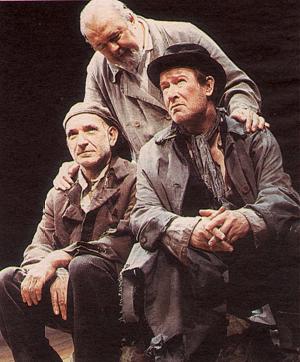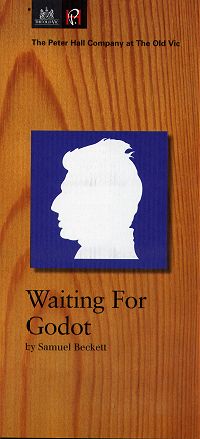Waiting For Godot
Waiting for Godot
|
Rather like the sublimely philistine poster for
the first Broadway production, which billed the play as "the Laugh Sensation of
Two Continents", recent stagings of Waiting for Godot have emphasised
the comedy in the piece to the exclusion of its poetry, mystery, formal beauty
and pain. True, the play uses the spectacle of a pair of tramps stuck on a
stage, engaged in the desperate business of having to keep a show going for two
and a half hours as a metaphor for the existential plight of needing to
improvise to hold back the void and to stave off that silence which, Beckett
once remarked, "is pouring into the play like water in a sinking
ship".
But it's disastrous if you portray the tramps
as being conscious of this theatrical self-reflexivity - a point proved when
Rik Mayall and Adrian Edmondson turned the play into a game of complicity with
their fans and so destroyed any sense of the characters' isolation. As did
Robin Williams in Mike Nichols' US staging, where he helped the poor old piece
out with manic horseplay. During the long Lucky monologue, for example, he'd
bark with boredom while sitting in the audience reading a punter's
programme.
Wanted: a production that treats Godot as a work of art rather
than a personality vehicle. |
 |
Coming back to the play some 42 years after he
directed the London premiere, Peter Hall obliges with just that. His staging is
beautifully alert to the changing moods and rhythms of the piece and consents
to be moving as well as very funny. The set is rightly abstract - polished bare
boards, a skeletal tree and boulder within a dark blue surround, with a moon
that floats up like the marker in an electric kettle at the sudden sad-comic
fall of night at the close of each act. This is "scenery" rather than
scenery.
As Vladimir and Estragon, Alan Howard and Ben
Kingsley are an excellent double act, establishing both the physical and
temperamental differences between the tramps and the mutual dependency that
makes the one almost unthinkable without the other. The cock-eyed comedy of
their vaudeville cross-talk comes over here all the clearer because of the
Irish accents they've adopted. The airy vibrato musings of Mr. Howard's
troubled Eeyore-faced, windy Vladimir are punctured by the brilliantly timed,
low-flying sceptical missiles from Mr. Kingsley's down-to-earth Estragon in his
back-to-front flat-cap. Whether suggesting that they hang themselves, with the
eager, helpfully matter-of-fact manner of someone proposing a trip to the pub
or sticking a cussed spanner into the works with questions like "What do we do
now, now that we're happy?", Kingsley is unfailingly superb.
The performances give an underlying dignity to this
derelict couple and a grace to their stoicism. There's a humanity in their
interdependency (betokened by the tender smile they exchange here as they
acknowledge it's now too late to separate) that is unlike the pervertedly
entrenched owner-slave bond between Denis Quilley's heartily heartless,
wonderfully stage struck Pozzo and Greg Hicks's transfixing Lucky.
Not that the production offers false comfort. Howard,
in particular, excels in the play's moments of inspired, impersonal desolation:
"Astride of a grave and a difficult birth. Down in the hole, lingeringly, the
grave-digger puts on the forceps. We have time to grow old. The air is full of
our cries." At such junctures, one seems to be getting a sneak preview of the
Lear Howard is to do next for Peter Hall.
Paul Taylor.
The Independent. 30.6.97.

